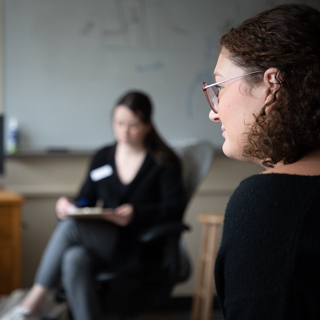Dylan Pryor

OUTSTANDING AFI – QUESTIONS:
What degree(s) do you have and where did you earn it (them)?
BSW (2015) and MSW (2017) – earned from University of Montana.
What is your current role at your organization?
Care Coordinator at First Step Resource Center. I provide family advocacy and therapy to children who have experienced trauma and their caregivers.
How did you come to work at your organization?
In 2015, I started my two-year MSW practicum at First Step. Following graduation of the MSW program, I was offered the Care Coordinator position and have been in this role for the past 5 years.
What do you appreciate most about supervising practicum students?
I appreciate the diverse perspectives practicum students bring to the work. They come with fresh eyes, energy, and a sense of curiosity that creates space for our organization to reflect on our practices - ensuring we are best serving the needs of our clients. I especially appreciate a practicum student’s willingness to engage in conflict and raise questions.
What does being a social worker mean to you?
For me, being a social worker begins with building relationships. Through relationship, we can create space for healing, support, conflict, and repair. Working at a Child Advocacy Center, we get the opportunity to build relationships with not only children and families we serve, but the larger system of agencies responding to child abuse in our community. With a foundation of relationship, restoration of harm can occur. Another important aspect of being a social worker is utilizing a holistic framework; considering how one’s environment, trauma history, culture, and community may impact a person’s behavior and worldview.
How does your role as a social worker relate to your role as a supervisor?
I approach supervision as I do my role as a social worker, with relationship at the forefront. As a person working with those who have experienced trauma, connection and safety are the pillars of my work. With supervision my goal is to build a safe, trusting relationship with supervisees, inviting a reciprocal process of learning from one another.
What is the most important thing you hope your practicum students take with them into their careers?
I hope practicum students take away the value of addressing secondary trauma. Working in a setting where we support the traumatic experiences of others, it is important we care for ourselves. I hope students prioritize connecting with colleagues in a way that addresses the collective, vicarious experiences shared as a means of caring for oneself.
What is your favorite quote that exemplifies social work?
Be kind, everyone is fighting their own battle. (This was the quote I used in my senior yearbook – should have known I would become a social worker at that point).
